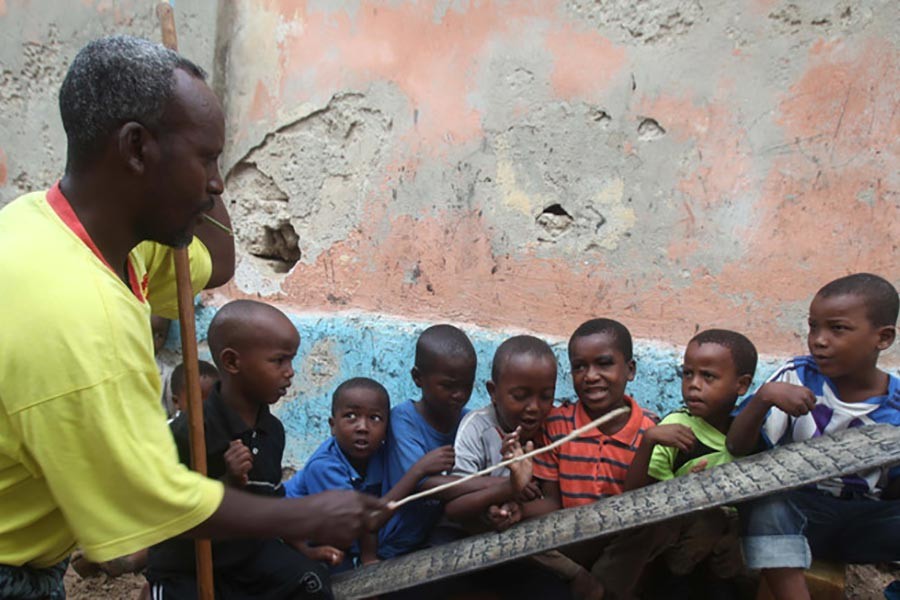Continuous declines in international education aid are depriving half of all young people in the developing world - some 800 million children - of the education they will need to secure meaningful employment in the future. Having fallen from $13.2 billion to $13 billion this year, total education aid (from bilateral and multilateral sources) now accounts for just 7.0 per cent of the world's total aid budget. This means that all the development aid in the world is worth little more than $10 per child in need, which is not even enough to pay for second-hand textbooks.
Across the developing world, the average level of education is 100 years behind that of the West. In Africa, annual spending on schooling averages just $200 dollars per child, whereas developed economies spend 40 times that: $9,500 per head. Though the international community has committed to achieving universal primary and secondary education by 2030, at least 200 million children will be out of school each year between now and then; another 400 million will not advance past the primary level. While African and Asian countries might appear to offer an abundant supply of labour, endemic skill shortages as a result of inadequate education funding will mean that they cannot attract the inward investment needed to pursue further development.
At the global level, the share of total aid dedicated to education has fallen steadily from its 2007 peak of 11 per cent even though it is common knowledge that education is one of the most effective ways to achieve the United Nations Sustainable Development Goals (SDGs) for health, employment, and quality of life. The European Union's (EU) recent announcement that it will allocate 10 per cent of its humanitarian aid to education is welcome, but hardly sufficient.
Yes, the international community has chalked up some relative successes, such as providing classroom seats for almost 60 per cent of Syrian refugees. But the fact remains that a significant share of the world's 30 million displaced children - 12 million of whom are refugees - will go through their school-age years without ever having set foot in a school. Across the world's 35 conflict zones, 75 million children are currently being denied both education and the prospect of future employment.
Obviously, international education aid will have to increase. Yet with a $40 billion annual funding gap for primary and secondary education alone, it is also clear that we need a new approach. In addition to mobilising private sources of finance, we must make the already available aid (this year's $13 billion) go much further than it has in the past, by creating incentives for recipient governments to increase their own investments in education.
Fortunately, over the past year, a host of private ESG (environmental, social, and governance) and SDG funds have been formed to meet the growing demand for investments based on social impact. In India, employers are now required by law to channel 2.0 per cent of profits to philanthropic causes. And around the world, companies are being challenged to produce environmental- and social-impact-weighted accounts.
Those involved in education aid are also adopting innovative finance, after long being laggards in this regard. Chief among the new financing instruments is the Education Commission's International Finance Facility for Education, which will be inaugurated at the UN General Assembly this September. With plans to raise an additional $10 billion for education funding, the IFFEd is based on two other public-private partnerships that have proven successful in recent years.
The first is the International Finance Facility for Immunisation, which, since its launch in 2006, has raised more than $6.0 billion by issuing capital-market bonds that will be paid back over 30 years with pledged funds from Australia, Brazil, France, Italy, the Netherlands, Norway, South Africa, Spain, Sweden, and the United Kingdom. The IFFIm, which raises funds for Gavi, the Vaccine Alliance, has already helped to vaccinate 700 million children, saving some five million young lives.
The second source of inspiration for the IFFEd is the Advanced Market Commitment model for bringing new drugs to market. Through a $1.5 billion AMC for pneumococcal vaccines, Gavi - along with the World Bank and other multilateral institutions, donor countries, and the Bill & Melinda Gates Foundation - has helped to immunise 49 million children, preventing a quarter-million deaths from pneumonia in children under five years old.
With a similarly structured public-private partnership, the IFFEd is designed to end the stop-go nature of education aid flows. Instead of relying on a funding tap that is periodically turned off, it will ensure continuous and consistent education financing for children from age five to 16. With $2.0 billion in funds pledged by a coalition of committed governments, the World Bank and various regional development banks will be able to generate four times more financing through capital markets. And by creating a $2.0 billion buy-down facility to reduce the costs of interest payments, they can provide an additional $10 billion in education aid - nearly doubling the current level.
In 2015, the UN, the International Monetary Fund, and the World Bank made a pledge to go from "Billions to Trillions" to "meet the investment needs of the Sustainable Development Goals." They realised that public-private partnerships have a crucial role to play in maximising the value of international aid. Now, we must turn words into action, lest we break yet another development promise. If we can educate an entire generation of children, we will have made history. It's time to get started.
Gordon Brown, former Prime Minister and Chancellor of the Exchequer of the United Kingdom, is United Nations Special Envoy for Global Education and Chair of the International Commission on Financing Global Education Opportunity. He chairs the Advisory Board of the Catalyst Foundation.
Copyright: Project Syndicate, 2019.
www.project-syndicate.org
distribution@project-syndicate.org


